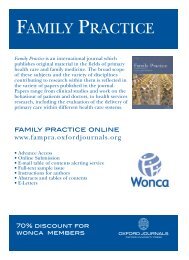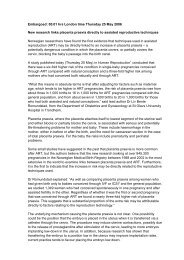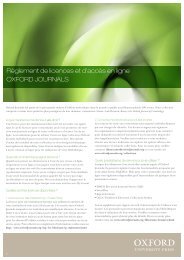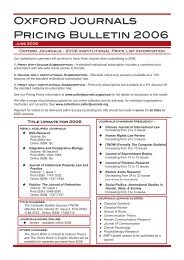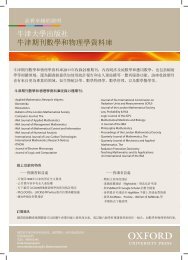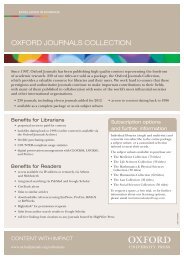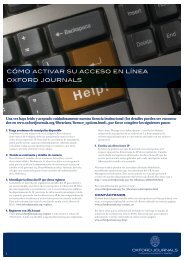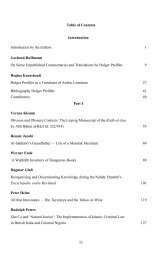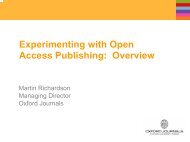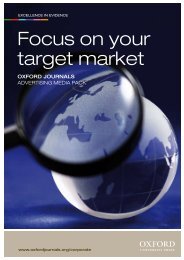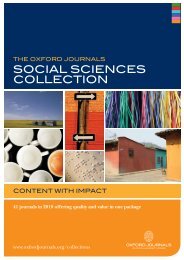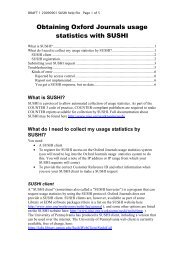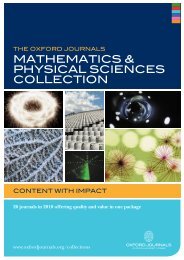Download the ESMO 2012 Abstract Book - Oxford Journals
Download the ESMO 2012 Abstract Book - Oxford Journals
Download the ESMO 2012 Abstract Book - Oxford Journals
You also want an ePaper? Increase the reach of your titles
YUMPU automatically turns print PDFs into web optimized ePapers that Google loves.
Annals of Oncology<br />
reaction (HFSR) (71.9%), and <strong>the</strong> incidence at 4weeks, 8weeks,12weeks was<br />
64.1%,45.3% and 37.5% respectively, showing a decline of HFSR incidence along<br />
with <strong>the</strong> time of <strong>the</strong>rapy . 21.9% of patients occurred ≥grade 2 o<strong>the</strong>r dermatologic<br />
reactions o<strong>the</strong>r than HFSR, followed by diarrhea (26.2%), hypertension (15.4%) .<br />
Dose interruptions due to toxicity happened in 19 patients (29.2%).<br />
Conclusion: Sorafenib mono<strong>the</strong>rapy has encouraging efficacy improving PFS and OS<br />
with tolerable toxicity as second or third line treatment in patients with advanced<br />
lung adenocarcinoma, who have failed prior chemo<strong>the</strong>rapy and EGFR-TKI<br />
treatment. Fur<strong>the</strong>r randomized studies are needed to confirm <strong>the</strong> clinical benefit of<br />
sorafenib in such patients.<br />
Disclosure: All authors have declared no conflicts of interest.<br />
1364TiP A RANDOMIZED, PHASE II, MULTICENTER,<br />
DOUBLE-BLIND, PLACEBO-CONTROLLED STUDY OF<br />
ONARTUZUMAB (METMAB) WITH EITHER BEVACIZUMAB +<br />
PLATINUM + PACLITAXEL OR PEMETREXED + PLATINUM<br />
AS FIRST-LINE TREATMENT FOR PATIENTS (PTS) WITH<br />
STAGE IIIB OR IV NON-SQUAMOUS NON-SMALL CELL<br />
LUNG CANCER (NSCLC)<br />
H. Wakelee 1 ,W.Yu 2 , K. Rittweger 3 , V.E. Paton 2<br />
1 Thoracic Oncology, Stanford University Cancer Center, Stanford, CA, UNITED<br />
STATES OF AMERICA, 2 Oncology, Genentech Inc, South San Francisco, CA,<br />
UNITED STATES OF AMERICA, 3 Oncology, Hoffman-La Roche, Nutley, NJ,<br />
UNITED STATES OF AMERICA<br />
Background: Dysregulation of <strong>the</strong> HGF/Met pathway has been associated with<br />
tumorigenesis in many malignancies, including NSCLC. Onartuzumab (MetMAb) is<br />
a recombinant, humanized, monovalent monoclonal antibody directed against Met.<br />
In a phase Ia/Ib study, onartuzumab (+/- bevacizumab) was well tolerated in pts with<br />
advanced solid tumors (Moss et al. Ann Oncol 2010;21(Suppl. 8):Abstr. 504P). In a<br />
phase II study of pts with previously treated NSCLC, onartuzumab + erlotinib was<br />
associated with a significant benefit in PFS (HR 0.53; p = 0.04) and OS (HR 0.37; p =<br />
0.002) compared with erlotinib alone in pts with Met IHC diagnostic-positive<br />
(Met-positive) tumors (Spigel et al. J Clin Oncol 2011;29(Suppl.):Abstr. 7505). Pts<br />
with Met-negative tumors who received onartuzumab + erlotinib reported worse<br />
outcomes compared with erlotinib alone (PFS HR 1.82, p = 0.05; OS HR 1.78, p =<br />
0.16). An interaction between onartuzumab and erlotinib could explain this outcome<br />
and <strong>the</strong>refore may not be seen in this study with chemo<strong>the</strong>rapy. The most<br />
commonly reported adverse events associated with onartuzumab are peripheral<br />
edema and fatigue. An early safety review is planned for this study.<br />
Methods: In this study <strong>the</strong> treating physician will assign appropriate chemo<strong>the</strong>rapy<br />
for each pt (Cohort 1: bevacizumab + platinum + paclitaxel; Cohort 2: pemetrexed +<br />
platinum). Eligible pts within cohorts will be stratified by Met IHC status (positive vs<br />
negative) and randomized (1:1) to receive 4 cycles of chemo<strong>the</strong>rapy + onartuzumab<br />
or placebo. Thereafter, pts without disease progression may continue to receive<br />
placebo or onartuzumab (+ cohort-assigned chemo<strong>the</strong>rapy, without platinum or<br />
paclitaxel) until disease progression, unacceptable toxicity, or death. The co-primary<br />
endpoints are PFS in all pts and by Met status. Secondary endpoints include OS,<br />
ORR, safety, and PK. Approximately 260 pts will be randomized until 130 pts with<br />
Met-positive NSCLC are enrolled. This study is open for accrual; fur<strong>the</strong>r details can<br />
be found on ClinicalTrials.gov (NCT01496742).<br />
Disclosure: H. Wakelee: Dr. Wakelee reports an uncompensated consultancy/<br />
advisory relationship with Genentech-Roche. Dr Wakelee receives research funding<br />
(through Stanford University) from Genentech-Roche. W. Yu: Dr Yu is a full-time<br />
employee of Genentech, Inc. and minor stockholder of Hoffmann-La Roche, Inc. K.<br />
Rittweger: Mrs Rittweger is a full-time employee of Hoffmann-La Roche, Inc. V.E.<br />
Paton: Dr Paton is a full-time employee of Genentech, Inc. and minor stockholder of<br />
Hoffmann-La Roche, Inc.<br />
1365TiP A RANDOMIZED, PHASE II, MULTICENTER,<br />
DOUBLE-BLIND, PLACEBO-CONTROLLED STUDY OF<br />
ONARTUZUMAB (METMAB) IN COMBINATION WITH<br />
PACLITAXEL + CISPLATIN (OR CARBOPLATIN) AS<br />
FIRST-LINE TREATMENT FOR PATIENTS (PTS) WITH<br />
STAGE IIIB OR IV SQUAMOUS NON-SMALL CELL LUNG<br />
CANCER (NSCLC)<br />
F.R. Hirsch1 , D. Gandara2 , R. Govindan3 , V.E. Paton4 ,W.Yu4 1<br />
Department of Medicine, University of Colorado Denver, Denver, CO, UNITED<br />
STATES OF AMERICA, 2 Thoracic Oncolology Program, UC Davis Cancer Center,<br />
Sacramento, CA, UNITED STATES OF AMERICA, 3 Oncology, Washington<br />
University School of Medicine, St. Louis, MO, UNITED STATES OF AMERICA,<br />
4<br />
Oncology, Genentech Inc, South San Francisco, CA, UNITED STATES OF<br />
AMERICA<br />
Background: Dysregulation of <strong>the</strong> HGF/Met pathway has been associated with<br />
tumorigenesis in many malignancies, including NSCLC. Onartuzumab (MetMAb) is<br />
a recombinant, humanized, monovalent monoclonal antibody directed against Met.<br />
By binding to <strong>the</strong> extracellular domain of Met, onartuzumab selectively blocks<br />
ligand binding and subsequent activation by HGF. Current data support a strategy<br />
of combining onartuzumab with numerous chemo<strong>the</strong>rapies and targeted agents<br />
(bevacizumab, erlotinib). In a phase Ia/Ib study, onartuzumab (mono<strong>the</strong>rapy and in<br />
combination with bevacizumab) was shown to be well tolerated in pts with<br />
advanced solid tumors (Moss et al. Ann Oncol 2010;21(Suppl. 8):Abstr. 504P). A<br />
phase II study of onartuzumab in combination with erlotinib in pts with previously<br />
treated NSCLC reported a significant benefit in PFS (HR 0.53; p = 0.04) and OS<br />
(HR 0.37; p = 0.002) in pts with Met-positive (Met IHC diagnostic positive) tumors<br />
(Spigel et al. J Clin Oncol 2011;29 (Suppl.):Abstr. 7505). Pts with Met-negative<br />
tumors who received onartuzumab + erlotinib reported worse outcomes compared<br />
with erlotinib alone (PFS HR 1.82; p = 0.05; OS HR 1.78; p = 0.16). The most<br />
commonly reported adverse events associated with onartuzumab are peripheral<br />
edema and fatigue.<br />
Methods: In this phase II study, pts with squamous NSCLC are randomized (1:1) to<br />
receive 4 cycles of paclitaxel, cisplatin (or carboplatin) and ei<strong>the</strong>r placebo or<br />
onartuzumab. Pts without disease progression may continue to receive placebo or<br />
onartuzumab as maintenance <strong>the</strong>rapy until disease progression, unacceptable toxicity,<br />
or death. The primary study endpoint is PFS in all pts. PFS by Met IHC diagnostic<br />
status (Met positive vs Met negative) will also be analyzed. Secondary endpoints<br />
include OS, ORR, safety, and PK. A minimum of 110 pts will be randomized to<br />
achieve 55 pts with Met-positive squamous NSCLC. A maximum of 55 pts with<br />
Met-negative squamous NSCLC will be enrolled. This study is open for accrual;<br />
fur<strong>the</strong>r details can be found on ClinicalTrials.gov (NCT01519804).<br />
Disclosure: F.R. Hirsch: Advisory relationship: Genentech-Roche,<br />
Boehringer-Ingelheim, Pfizer, Merck-Serono, Bristol-Myers Squibb. Research<br />
funding (through University of Colorado): Imclone-Lilly, Celgene, Morphotek.<br />
Board of Directors: IASLC. D. Gandara: Dr. Gandara reports a consultant/advisory<br />
relationship with Genentech, Inc. He also receives research funding from<br />
Genentech, Inc. R. Govindan: Dr. Govindan reports a consultant/advisory<br />
relationship with Bristol-Myers Squibb, Boehringer-Ingelheim, Astra Zeneca, Pfizer,<br />
Genentech, Inc. and GlaxoSmithKline. V.E. Paton: Dr Paton is a full-time employee<br />
of Genentech, Inc. and minor stockholder of Hoffmann-La Roche, Inc. W. Yu: Dr<br />
Yu is a full-time employee of Genentech, Inc. and minor stockholder of<br />
Hoffmann-La Roche, Inc.<br />
1366TiP PHASE II STUDY OF ERLOTINIB FOR PREVIOUSLY<br />
TREATED NON-SMALL CELL LUNG CANCER PATIENTS<br />
WITHOUT EPIDERMAL GROWTH FACTOR RECEPTOR<br />
MUTATION: CENTRAL JAPAN LUNG STUDY GROUP<br />
(CJLSG) 0903 TRIAL<br />
M. Morise 1 , H. Taniguchi 2 , H. Saka 3 , J. Shindoh 4 , R. Suzuki 5 , E. Kojima 6 ,<br />
T. Hase 1 , M. Kondo 1 , H. Saito 7 , Y. Hasegawa 1<br />
1 Respiratory Medicine, Nagoya University Graduate School of Medicine, Nagoya,<br />
JAPAN, 2 Department of Respiratory Medicine and Allergy, Tosei General<br />
Hospital, Seto, JAPAN, 3 Medical Oncology & Respiratory Medicine, National<br />
Hospital Organization Nagoya Medical Center, Nagoya, JAPAN, 4 Respiratory<br />
Medicine, Ogaki Municipal Hospital, Ogaki, JAPAN, 5 Respiratory Medicine,<br />
Toyohashi Municipal Hospital, Toyohashi, JAPAN, 6 Respiratory Medicine, Komaki<br />
Municipal Hospital, Komaki, JAPAN, 7 Respiratory Medicine, Aichi Cancer Center<br />
Aichi Hospital, Okazaki, JAPAN<br />
Background: Erlotinib has been shown moderate activity for previously treated<br />
non-small cell lung cancer (NSCLC) patients with wild-type epidermal growth<br />
factor receptor (EGFR). However, <strong>the</strong> sensitivity of methods for detection of EGFR<br />
mutations can influence <strong>the</strong> efficacy of erlotinib. Moreover, it is controversial about<br />
association between K-ras mutations and erlotinib resistance in EGFR wild-type<br />
NSCLC. Here, we conducted a phase II study of erlotinib for previously treated<br />
NSCLC patients without EGFR mutation screened by PNA-LNA PCR clamp<br />
methods, which is known to be highly sensitive method for <strong>the</strong> detection of EGFR<br />
mutations. Fur<strong>the</strong>rmore, we have planned exploratory reanalysis of EGFR mutation<br />
status and screening of K-ras mutation status by <strong>the</strong> Scorpion Arms method which<br />
is also highly sensitive method among patients whose samples are available for<br />
analysis.<br />
Patients and methods: Major eligibility criteria were advanced NSCLC with<br />
EGFR-wild type (gene analysis by PNA-LNA PCR clamp method), previously treated<br />
with one or two chemo<strong>the</strong>rapy, and ECOG performance status (PS) of 0-2. Oral<br />
erlotinib 150mg was given daily until progression or unacceptable toxicity. The<br />
primary objective of <strong>the</strong> study was objective response rate. Secondary objectives were<br />
tolerability, progression-free survival, overall survival, verification of <strong>the</strong> concordance<br />
of EGFR mutation detection between <strong>the</strong> PNA-LNA PCR clamp method and<br />
Scorpion ARMS method, and screening K-ras mutation status by Scorpion ARMS<br />
methods. As of April <strong>2012</strong>, enrollment of 55 patients has been completed. The study<br />
is in progress and we are planning data cut-off for efficacy and safety analysis in<br />
August <strong>2012</strong>. (Unique trial Number; UMIN000002692)<br />
Disclosure: H. Taniguchi: Hiroyuki Taniguchi has served as a member of advisory<br />
boards for Boehringer-Ingelheim, Chugai-Pharma, Shionogi & Co. Ltd. H. Saito:<br />
Hiroshi Saito received research funding from Chugai Pharmaceuticals. Y. Hasegawa:<br />
Yoshinori Hasegawa received research funding from Chugai Pharmaceuticals. All<br />
o<strong>the</strong>r authors have declared no conflicts of interest.<br />
Volume 23 | Supplement 9 | September <strong>2012</strong> doi:10.1093/annonc/mds409 | ix445



